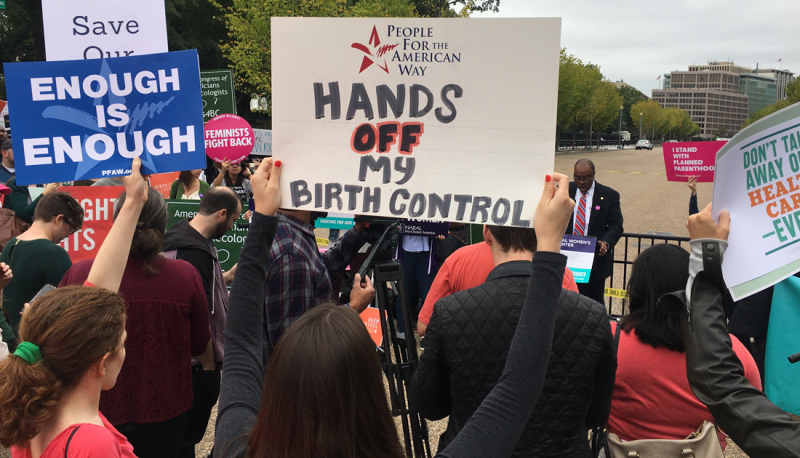In May 2018, the Trump administration teed up a public health disaster when it proposed devastating changes to the Title X family planning program. Despite mass public outcry, the final domestic gag rule was released on March 4 and is set to go into effect on May 3. Planned Parenthood and the American Medical Association and the National Family Planning & Reproductive Health Association are among those who have filed lawsuits to block the rule. As we await news, we are also monitoring Title X developments on Capitol Hill. PFAW and allied organizations wrote to House appropriators on March 5 and urged them to stand up to Trump’s attacks and fund Title X:
Chairwoman DeLauro, Ranking Member Cole, and Subcommittee Members:
The undersigned organizations collectively represent millions of providers, patients, administrators, researchers, public health professionals, and advocates who support robust federal funding of the Title X family planning program, which helps ensure that millions of individuals can obtain high-quality sexual and reproductive health services. We are deeply concerned by the administration’s continued attacks on the integrity of the Title X program, as demonstrated by the devastating rule that the Department of Health and Human Services published yesterday.1
We urge Congress to use the fiscal year (FY) 2020 Labor, Health and Human Services, Education, and Related Agencies appropriations bill to make a strong statement in support of Title X’s high-quality, evidence-based, and patient-centered family planning care by funding the program at $400 million.
Title X is a Critical Source of Care
Title X helps more than 4 million people access family planning and related health services at nearly 4,000 health centers around the country annually.2 More than 1.7 million of the people served are women of color.3 For many individuals, particularly those who have low incomes, are under- or un-insured, or are adolescents, Title X is their main access point to obtain affordable and confidential contraception, cancer screenings, sexually transmitted disease testing and treatment, complete and medically accurate information about their family planning options, and other basic care. In fact, a 2017 study found six in ten women seeking contraceptive services at a Title X health center saw no other health care providers that year.4
The data shows that Title X makes a difference for patients. In 2015 alone, Title X-supported contraceptive services helped patients prevent an estimated 822,000 pregnancies.5 In addition to that direct clinical care, Title X supports important health center efforts that are not reimbursable under Medicaid or private insurance, including staff training and community-based sexual and reproductive health education programs. Moreover, research has shown that Title X-supported services save the federal and state governments approximately $7 billion a year,6 and 75% of American adults—including 66% of Republicans, 75% of Independents, and 84% of Democrats—support the program.7
Title X is Severely Underfunded
In spite of the critical importance of equitable access to family planning services for all people, regardless of their income or insurance status, Title X remains woefully underfunded. In 2016, researchers from the Centers for Disease Control and Prevention, the Office of Population Affairs, and George Washington University estimated that Title X would need $737 million annually to deliver family planning care to all uninsured women with low incomes in the United States.8 This estimate understates the true need for Title X, as it does not include an estimate of costs for men (who made up 12% of patients in the network in 20179), gender non-binary persons, and the insured patients who rely on Title X’s confidentiality protections.
The gap between the funds appropriated and the funds needed has only grown in recent years. From 2010 to 2014 the number of women who needed publicly funded family planning services increased by one million,10 but Congress cut Title X’s funding by $31 million over that period. That decrease unfortunately corresponded to dramatic decreases in the number of patients served at Title X–funded sites; the numbers dropped from 5.22 million in 201011 to just over 4 million in 2017.12 We are deeply concerned about diminishing access to high-quality family planning services and urge Congress to take an initial step to reverse this devastating trend by appropriating $400 million for Title X in FY 2020.
Title X Patients Face Diminished Access to Affordable, Quality Health Care Under New Rule
This funding request comes in the wake of a final rule from the Trump-Pence administration that is unlawful, coercive, and dangerous for patients’ health, including persons with low incomes, young people, people of color, LGBTQ people, and people experiencing intimate partner violence. On March 4, the administration published a final rule13 that disregards medical ethics and evidence-based federal guidelines in order to severely restrict the providers in the Title X network and the care that patients can receive from those remaining in the program. The undersigned organizations are firmly opposed to the rule and urge Congress to provide enhanced funding in FY 2020 to support the providers currently offering high-quality, patient-centered care across the country. By increasing funding to Title X, more individuals will receive evidence-based care and Congress will powerfully demonstrate its support for the Title X program in its current form, as separate efforts to prevent the rule’s implementation move ahead.
Conclusion
During the FY 2020 appropriations process, Congress has the opportunity to stand against relentless attacks on family planning and support strong public funding for the Title X family planning network. The undersigned organizations urge you to begin the expansion of family planning and related health care services with this meaningful investment in Title X.
If you have any questions or would like additional information, please contact Lauren Weiss at the National Family Planning & Reproductive Health Association at [email protected] or 202-552-0151.
Thank you for considering these requests.
We plan to reissue this letter as developments warrant:
- 5/28/19: Sent to Senate appropriators regarding the FY20 Labor-HHS-Education bill
